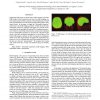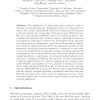79 search results - page 14 / 16 » Computational criticisms of the revelation principle |
ISBI
2011
IEEE
12 years 11 months ago
2011
IEEE
Segmenting brain from non-brain tissue within magnetic resonance (MR) images of the human head, also known as skull-stripping, is a critical processing step in the analysis of neu...
CHI
2001
ACM
14 years 7 months ago
2001
ACM
CARD (Collaborative Analysis of Requirements and Design) is an influential technique for participatory design and participatory analysis that is in use on three continents. This p...
NECO
2011
13 years 2 months ago
2011
The neocortex has a remarkably uniform neuronal organization, suggesting that common principles of processing are employed throughout its extent. In particular, the patterns of co...
RECOMB
2006
Springer
14 years 7 months ago
2006
Springer
The assignment of orthologous genes between a pair of genomes is a fundamental and challenging problem in comparative genomics, since many computational methods for solving various...
LFCS
2007
Springer
14 years 1 months ago
2007
Springer
act Completion (Full Version) Guillaume Burel Claude Kirchner August 6, 2007 Deduction Modulo implements Poincar´e’s principle by identifying deduction and computation as diff...


